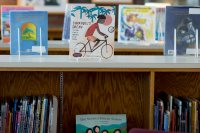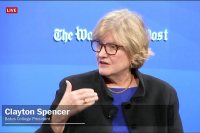
A year ago this week, Bates and the polling firm Gallup announced findings from a new survey that confirmed the premise of the college’s Purposeful Work program: that achieving a sense of purpose in work gives us an overall sense of well-being and meaning.
In a world turned upside down by a global pandemic, a sense of purpose — in all parts of our lives — is now more important than ever, says Rebecca Fraser-Thill, a visiting instructor in psychology at Bates who is director of faculty engagement and outreach for Purposeful Work.
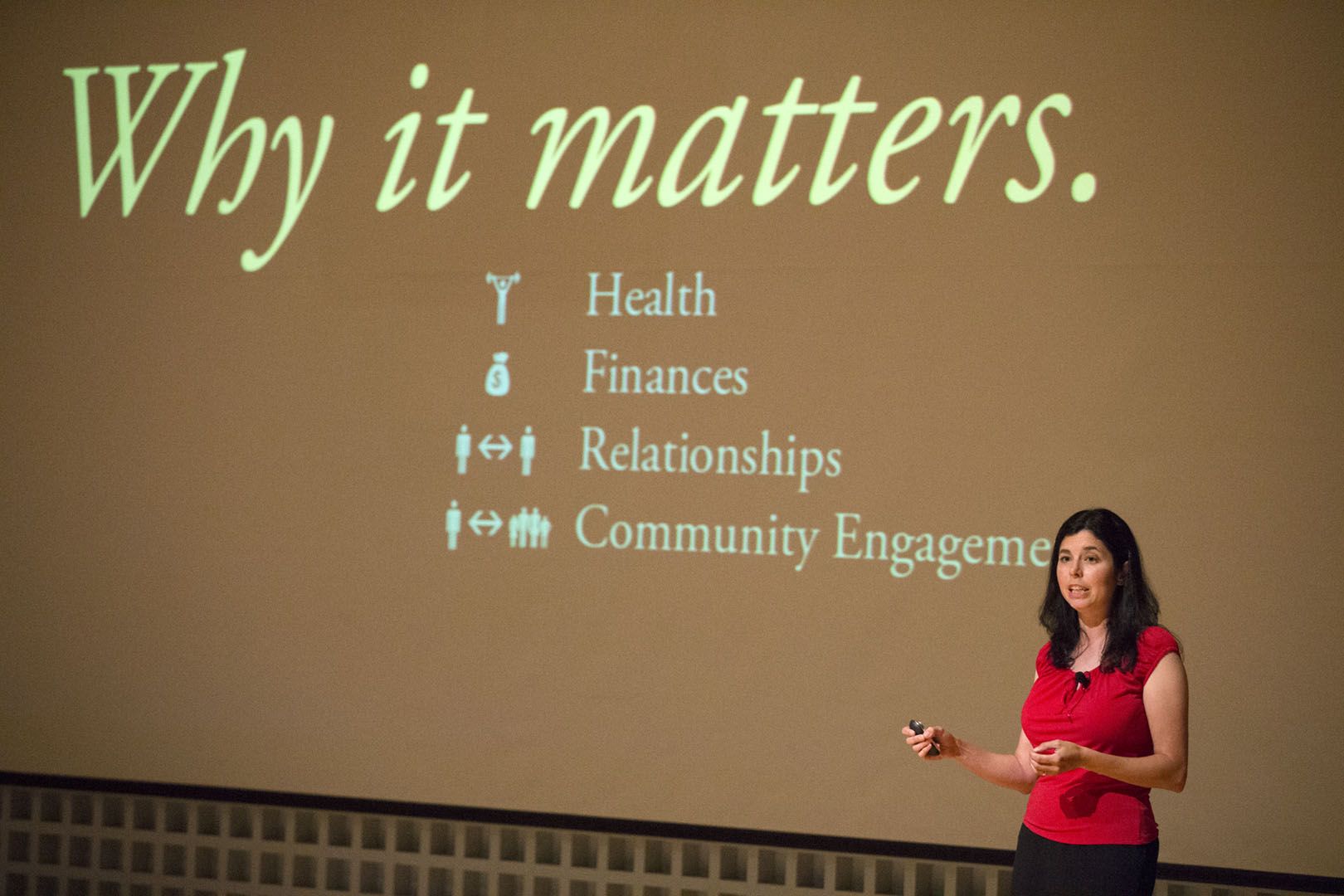
In August 2016 Rebecca Fraser-Thill talks about Purposeful Work with parents of students in the Class of 2020. (Phyllis Graber Jensen/Bates College)
“When life is uncertain and old rhythms and routines have become memories we mourn, it can be easy to slip into a sense of ‘Why bother?’” she acknowledges.
“But we need a reason to get out of bed in the morning, and we need that motivation to stay front of mind. Staying purpose-minded not only benefits our mental health but — extremely important during the COVID-19 outbreak — our physical health, as well.”
Here at Bates, the college’s Center for Purposeful Work — which uses mentoring, internships, and curricular and co-curricular opportunities to give students the skills to find purposeful work — continues with urgency, remotely supporting Bates students, especially seniors.
In this Q&A, Fraser-Thill talks about Purposeful Work in a time of crisis; teaching psychology remotely; work-life balance; and how we’re living in “extremely purposeful times.”
In what ways does the philosophy of Purposeful Work relate to the current crisis?
The staff of Purposeful Work, as well as faculty who infuse their courses with discussions of meaning, purpose, and work, are making room for a lot of reflection. Reflection is and always has been baked into everything that’s Purposeful Work.
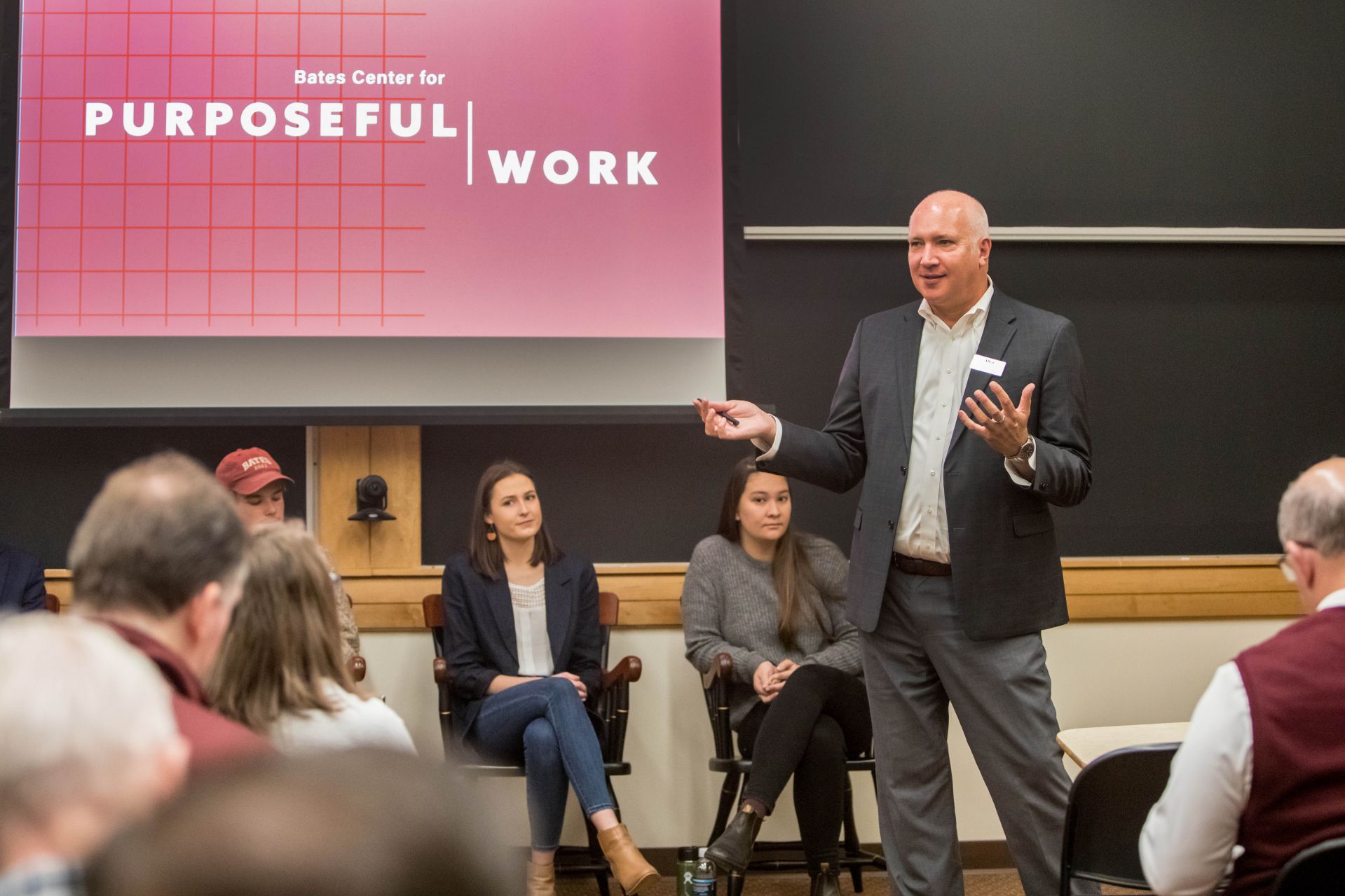
Senior Associate Dean Allen Delong, who leads the Bates Center for Purposeful Work, introduces a student panel discussion on Purposeful Work during Back to Bates in October 2019. (Rene Roy for Bates College)
Reflection is invaluable at all times, but it’s especially important during a time of uncertainty. Being able to meaningfully reflect on what’s happening around you, what you’re learning from what’s happening, and what it means to move forward thoughtfully based on both of those answers is absolutely critical right now.
Some of the questions that times of big change inspire include what new needs are emerging in the world, which avenues that previously seemed important or feasible no longer do, where our strengths meet with the challenges that are becoming amplified, and so on.
How has the change to remote learning affected your teaching?
It’s been quite the learning curve. I have two kids, 4 and 9, who are now being home-schooled. My home office is partly home to their toys. So I wait until my kids are asleep, and at about 10 p.m. head to the basement to record my lectures for Psychology 101 so that my loud voice doesn’t wake up my children upstairs.
We’re a community at Bates. It’s a real thing. And we genuinely do care about one another, and we miss each other.
But despite all that has changed, there are things that haven’t changed about the way I’m teaching and the way I’m engaging with my students.
No. 1, we care about each other quite deeply. We’re a community at Bates. It’s a real thing. And we genuinely do care about one another, and we miss each other. I had some Google Hangouts today with some of my Psych 101 students, thesis students, some students from my seminar, and we were so happy just to see each other even though it’s through virtual means.
How are you personally approaching this crisis?
I feel what it’s like to have a work-life blend, which I’ve often espoused as a goal. I’m getting to live that in a whole new way now!
The No. 1 thing I’m focusing on is that we all need a reason to wake up every day right now, more than ever, we need to feel like there is a purpose to what we’re doing.
This is actually a psychological issue that’s going on right now, in real time.
And so it’s been really fascinating in many ways to have two kids now home all the time: a third-grader who’s trying to home-school and a pre-K child who is not able to do a lot of what you do in pre-K, which is socialize with peers. And to also try to do my teaching and work, and on top of that, just make sense of all that’s going on around us.
What does it feel like to teach psychology to your students in this crisis?
In our virtual classroom, it’s about putting our intellectual curiosity at the forefront of what we’re doing — being able to think about why it matters that we study psychology, for instance. What we’re seeing and hearing over and over again is that human behaviors matter most for what’s going to happen with this pandemic.
And that is what psychology studies, right? We’d like to know: Why do people act the way they do and how can we change behaviors for the better? So this is actually a psychological issue that’s going on right now, in real time.
How does remote learning affect your and your students’ sense of purpose?
Continuing our learning and teaching has been a key source of purpose, which helps us feel a little more stable during very chaotic times. I miss the classroom immensely, as do my colleagues. I miss my students’ faces as they have insights, and the way we build off one another in a classroom setting.
That said, I’m amazed how much Google Docs is working for us to have virtual conversations asynchronously. We have been building off of each other’s thoughts in a rather amazing manner in the infancy seminar, “talking” back and forth to one another, even though we’re all logging into the document at different times over the course of a week.
Yet remote learning is not the same. It’s not ideal. I love residential liberal arts more now than ever before. However, we’re making the most of this, and I’m grateful for the opportunity to give it a shot.
Speaking of the upper-level seminar on infancy, did anything change in how you approached teaching that class as the crisis unfolded?
As we were preparing to go to remote learning, I shifted all of the readings from the topic of play to the topic of how the coronavirus is impacting our population of interest.
So we read up-to-date articles about how pregnant women and newborn babies are faring in this crisis. Also, what does it mean for schoolchildren to be home, both for the children themselves and their parents? What does that mean for the kids’ developmental process and what feels normative to them, but also for their family members who are now doing this whole different role with their children 24/7?
We were able to engage that topic right in real time in our seminar, which was really valuable and puts a point on the importance of this intellectual process that we’re all engaged in at Bates.
Our society is being told that productivity should not be our goal right now as we social-distance to flatten the curve and save lives. How does being purposeful dovetail — or not — with that shift?
Purpose and productivity are by no means mutually exclusive, but they are also not synonyms. Certainly, feeling a sense of purpose — a direction that is meaningful to us, has an impact beyond ourselves, and motivates our actions — often leads to productivity.
We often underestimate how “productive” we’ve been during hard times.
But the question is, what do we mean by “productivity”? Our society is rather obsessed with tangible evidence as a symbol of productivity. We have a harder time seeing actions that don’t yield a tangible outcome as being “productive.”
For instance, meditation is extremely valuable during times of stress, as is being present for the emotional needs of loved ones, colleagues, students. But meditating and being emotionally present doesn’t result in something tangible we can point to and say “I did that” or “I made that” — the outcomes are hard to see, and the impact might be noticeable only months or years later.
So we often underestimate how “productive” we’ve been during hard times, when much of our purposeful behavior is about less tangible, less “production-oriented” activities.
As we all recalibrate nearly every aspect of our lives, what role should purpose play?
Purpose pushes us out of complacency and into proactivity, resulting in healthier decisions and richer experiences, even amidst isolation, anxiety, and sadness.
Studies have found that adults who have a stronger sense of purpose have improved chances of longevity than people who have a weaker sense of purpose. Scientists don’t yet understand the mechanisms that drive the connection between purpose and mortality but whatever the cause, the relationship is clear and robust. We need purpose now more than ever.
We’re all so focused on the essentials, from buying toilet paper to eating three meals a day at home and taking walks to get exercise. How can we benefit from that and carry that forward?
In psych-speak, what you’re noting is that we’ve collectively moved down Maslow’s hierarchy of needs.
Abraham Maslow, a psychologist, believed that we have basic needs — physiological needs and safety needs — that need to be met before we can move on to higher-level needs including love, belongingness, esteem, and self-actualization, which is being the best version of ourselves.
Right now, we’re being forced to focus on the physiological and safety needs; they’re salient because they’re genuinely threatened.
Caring for the health and wellness and financial security of ourselves, our loved ones, and our community members gives us a very genuine sense of purpose.
But I disagree with Maslow’s notion that we can’t work on higher-level needs at the same time as lower-level needs, and a good deal of research supports me in saying that. Purpose, for instance, is generally considered to be a self-actualization need — something we can focus on only when every other need is met.
But caring for the health and wellness and financial security of ourselves, our loved ones, and our community members gives us a very genuine sense of purpose.
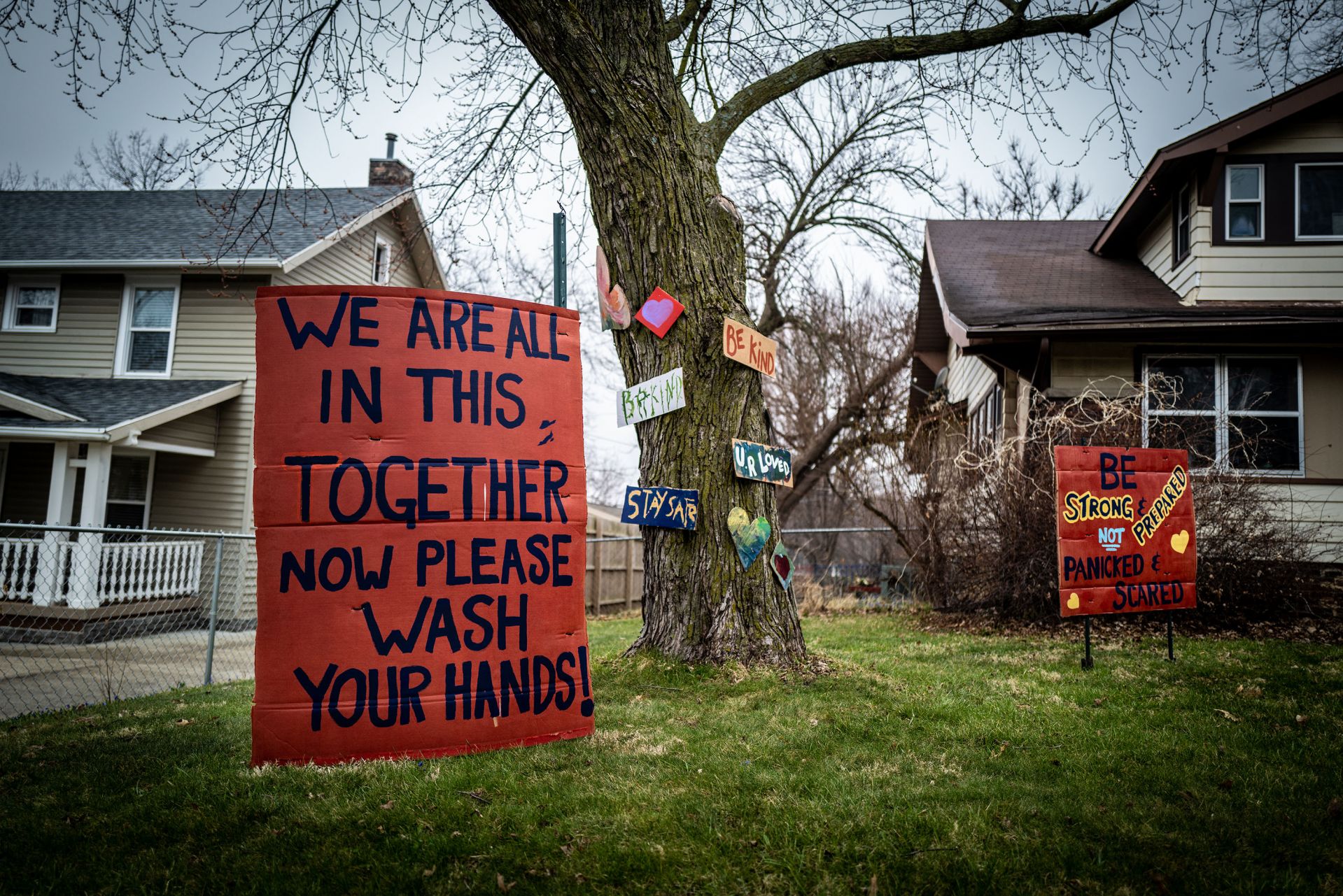
A house on 31st Street in Des Moines, Iowa, shares some messages with passing motorists. Caring for others offers a genuine sense of purpose, says Rebecca Fraser-Thill. (Photograph by Phil Roeder)
And, in an academic context, being present for our students’ crucial needs — cognitive stimulation, deep engagement, esteem, and belonging — during their emerging adult stage is absolutely critical. That’s something Bates staff and faculty are doing so thoughtfully and with so much commitment.
Living in this moment and meeting the needs that we’re being called upon to meet right here and now — I can’t think of a better example of living with purpose. These are extremely hard times. They are also extremely purposeful times, as a result.
